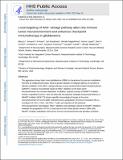Local Targeting of NAD + Salvage Pathway Alters the Immune Tumor Microenvironment and Enhances Checkpoint Immunotherapy in Glioblastoma
Author(s)
Li, Ming; Kirtane, Ameya R; Kiyokawa, Juri; Nagashima, Hiroaki; Lopes, Aaron; Tirmizi, Zain A; Lee, Christine K; Traverso, Giovanni; Cahill, Daniel P; Wakimoto, Hiroaki; ... Show more Show less
DownloadAccepted version (2.174Mb)
Open Access Policy
Open Access Policy
Creative Commons Attribution-Noncommercial-Share Alike
Terms of use
Metadata
Show full item recordAbstract
© 2020 American Association for Cancer Research. The aggressive primary brain tumor glioblastoma (GBM) is characterized by aberrant metabolism that fuels its malignant phenotype. Diverse genetic subtypes of malignant glioma are sensitive to selective inhibition of the NAD+ salvage pathway enzyme nicotinamide phosphoribosyltransferase (NAMPT). However, the potential impact of NAD+ depletion on the brain tumor microenvironment has not been elaborated. In addition, systemic toxicity of NAMPT inhibition remains a significant concern. Here we show that microparticle-mediated intratumoral delivery of NAMPT inhibitor GMX1778 induces specific immunologic changes in the tumor microenvironment of murine GBM, characterized by upregulation of immune checkpoint PD-L1, recruitment of CD3+, CD4+, and CD8+ T cells, and reduction of M2-polarized immunosuppressive macrophages. NAD+ depletion and autophagy induced byNAMPT inhibitors mediated the upregulation of PD-L1 transcripts and cell surface protein levels in GBM cells. NAMPT inhibitor modulation of the tumor immune microenvironment was therefore combined with PD-1 checkpoint blockade in vivo, significantly increasing the survival of GBM-bearing animals. Thus, the therapeutic impacts of NAMPT inhibition extended beyond neoplastic cells, shaping surrounding immune effectors. Microparticle delivery and release of NAMPT inhibitor at the tumor site offers a safe and robust means to alter an immune tumor microenvironment that could potentiate checkpoint immunotherapy for glioblastoma. Significance: Microparticle-mediated local inhibition of NAMPT modulates the tumor immune microenvironment and acts cooperatively with anti-PD-1 checkpoint blockade, offering a combination immunotherapy strategy for the treatment of GBM.
Date issued
2020Department
Koch Institute for Integrative Cancer Research at MIT; Massachusetts Institute of Technology. Department of Mechanical EngineeringJournal
Cancer Research
Publisher
American Association for Cancer Research (AACR)
Citation
Li, Ming, Kirtane, Ameya R, Kiyokawa, Juri, Nagashima, Hiroaki, Lopes, Aaron et al. 2020. "Local Targeting of NAD + Salvage Pathway Alters the Immune Tumor Microenvironment and Enhances Checkpoint Immunotherapy in Glioblastoma." Cancer Research, 80 (22).
Version: Author's final manuscript